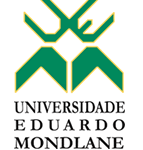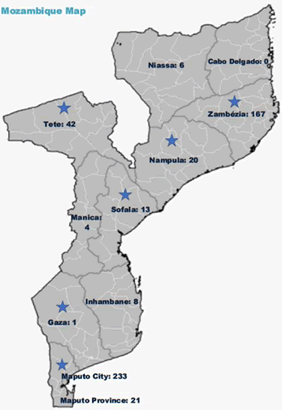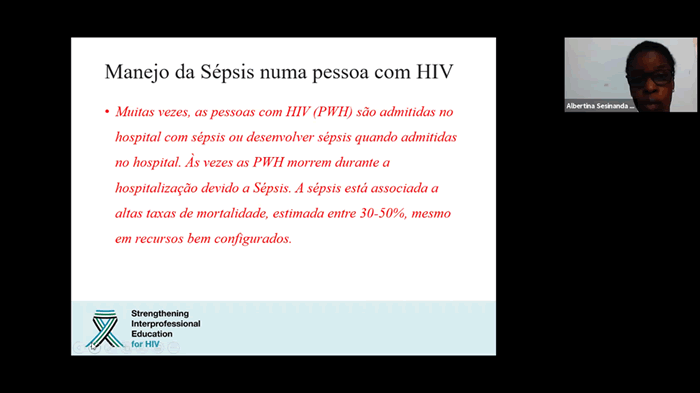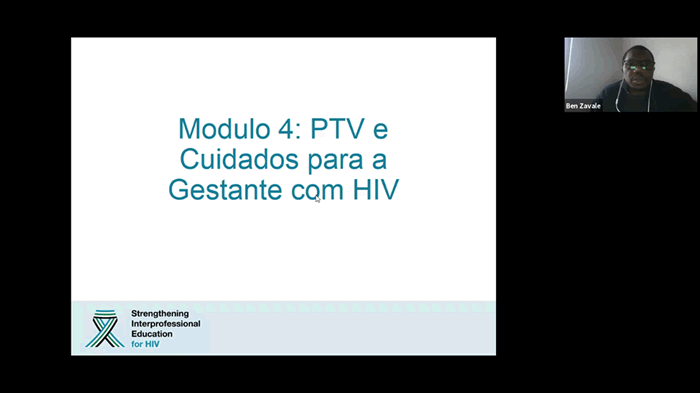 KEY PERSONNEL: Maria Alexandra Rodrigues (Principal Investigator), José Braz (training coordinator) Amin Daud (eLearning coordinator), Milva Nguenha (finance manager)
KEY PERSONNEL: Maria Alexandra Rodrigues (Principal Investigator), José Braz (training coordinator) Amin Daud (eLearning coordinator), Milva Nguenha (finance manager)
PROJECT TITLE: STRIPE HIV - Mozambique Institute for Health Education and Research (MIHER)
PROJECT YEAR 1 RECAP: The main aim was to develop a core team to work on teaching-learning process more efficiently. Faculty and health professionals involved in the trainings gained awareness of weak interprofessional relationships and their roles in addressing professional needs and constraints. Attention was given to ensuring strong links with HEPI and to contribute to the implementation of HEPI training programs with the introduction of the modules on HIV and COVID highlighting case-based, team-based learning and quality assurance.
The focus of training activities was to (1) improve confidence and change attitude; (2) develop ability to communicate with patients; (3) promote interprofessional collaborations among health professionals in the workplace; (4) improve the care for HIV patients; and (5) improve the quality of work in the health facilities. The core STRIPE modules were translated into Portuguese. A cadre of 53 facilitators was trained, leading 8 workshops training 175 preservice and working health professionals. were conducted for 175 learners.
PROJECT YEAR 2 SUMMARY: In Year 2 the UEM STRIPE program transitioned to delivering online trainings using both Zoom and the LMS (Moodle) platform. STRIPE virtual training modules and materials were translated into Portuguese and uploaded to the LMS. Facilitators (9) and pre-service learners (355) were drawn from 9 universities and the Ministry of Health, along with working health care professionals (160) from PEPFAR-supported provinces (Zambezi’s, Nampula) and Maputo. Trainings brought together diverse, mixed groups of professionals including medical doctors, nurses, laboratory technicians, nutritionists, pharmacists, psychologists, surgery technicians, and dentists, reinforcing the value of interprofessional training and teamwork.
MAIN ACCOMPLISHMENTS
- 9 facilitators from UEM, ISCISA, UniLurio were trained in the use of eLearning tools and techniques for conducting successful online trainings.
- 515 learners were trained, drawing in a larger and more diverse group of professional cadres, and reaching a broader geographic scope than Year 1.
- Successful transition to eLearning modalities, expansion of number of facilitators trained
- Translation of STRIPE virtual modules and materials into Portuguese
- 2 mid-career professionals were selected and included in the James Hakim Leadership Development Program
CHALLENGES AND SOLUTIONS
Whilst deploying the project year 2, the following challenges were identified:
- The delay in the availability of modules and pre-post tests in Portuguese on the LMS forced the team to start-off the Zoom sessions without learners completing the pre-tests, limiting the ability to properly access the level of understanding by participants.
- Some participants lacked IT know-how and struggled to use the Moodle platform. The Learner Guides were not available in Portuguese on the Moodle platform and therefore some participants struggled to understand the steps to take to download certificates.
- Some difficulties in accessing the Moodle link were encountered, in some cases participants bypassing the registration process by choosing the option to register without a token, which led them to a blank page without access to the modules.
- Without clear identification of which modules were mandatory, participants completed online modules of their interest and disregarded others.
- Due to COVID-19 restrictions, many students were studying and working from home, which meant they had limited access to computers and other devices (i.e. tablets) from their institutions and completed the courses using their personal cellphones (at times that of their relatives) which in most cases are very basic and of limited capacity to run the Moodle platform smoothly.
To overcome the above-mentioned challenges, the following solutions were developed:
- A tutorial video was prepared to show learners how to operate the LMS platform: https://1drv.ms/u/s!AmYSrbY-2VUWtwFb3WPfHM_o5ICh?e=07LXmg
- 4 members of the STRIPE team were allocated to contact registered participants via email and telephone and guide them on the LMS to explain necessary action items.
- Faculty and facilitators reached out to their focal points at institutions where learners were recruited requesting them to make efforts to contact the students directly and instruct them to complete the compulsory STRIPE modules and obtain their certificates.
- Weekly data packages were provided during the month of August and September for the remaining trainings and also to incentivize learners to complete their modules.
TRAINING PARTNERS
The following government and academic partners contributed program or faciliation support:
- MOH - Department of Health Promotion (DEPROS)
- Ministry of Health (MISAU)
- UniLurio - Lurio University
- UniZambeze - Zambeze University
- UniLicungo - Licungo University
- Health Sciences Institute of Maputo (ICSM)
- Health Sciences Institute of Quelimane (ICSQ)
- Health Sciences Institute of Tete (ICST)
- The Higher Institute of Health Sciences (ISCISA)
- Zambeze University – UniZambeze
- Catholic University of Mozambique (ICM)
PARTICIPATING CLINICAL SITES
|
Learners were recruited from the health facilities listed below, in addition to provincial hospitals and health care facilities and district offices for Women and Social Action (Figure 1).
|
Figure 1. Map of Mozambique depicting where learners were recruited from  |
IMPLEMENTATION
- Facilitators Trained: 9
|
Health Profession |
Years of Experience |
Gender |
Teaching Experience |
||||
|
Medical |
8 |
0-5 years |
1 |
Male |
5 |
HIV educator |
9 |
|
Nursing/Midwifery |
1 |
6-10 years |
4 |
Female |
4 |
Non-HIV educator |
0 |
|
> 11 years |
4 |
Additional |
|||||
- Learners trained: 515
|
|
Medical |
Nursing/Midwifery |
Pharmacy |
Laboratory |
Other |
Total |
|
Preservice |
217 |
58 |
17 |
11 |
52 |
355 |
|
Postgraduate < 12 months |
20 |
6 |
0 |
6 |
5 |
37 |
|
Postgraduate > 12 months |
47 |
29 |
9 |
4 |
34 |
123 |
|
Total |
284 |
93 |
26 |
21 |
91 |
515 |
|
Gender |
|
|
Male |
259 |
|
Female |
273 |
INNOVATING HIV TRAINING DURING COVID-19:
During the training period the country was mostly in a state of emergency. However, it was possible to deliver training programs in two ways using eLearning approaches with virtual trainings using Zoom and self-paced trainings using the online course hosted on the LMS. The interest of the participants was relevant but the pressure of the context was significant and, in some cases, limited the number of modules learners could undertake.
BROADER IMPACT:
- Changes in teaching approaches and design of training programs for e-learning educators has enabled a cadre of facilitators skilled and comfortable in leading remote learning.
- With the usage of eLearning technologies it is now possible to provide training to a larger group of working health professionals at their sites of practice or residence, including remote areas, without the cost and loss of time in travel and days of absence from their workplace. Continuity of education for pre-service learners is also possible when local factors preclude the ability to provide in-person learning. Zoom workshop and LMS courses were disseminated on various institutional web sites namely; MIHER (www.miher.org), national research institutions (UEM, INS), Ministry of Health and educational institutions (UniLurio, ISCISA, UEM).
- Materials are now available in Portuguese for broader use in Lusophone countries.
- A widely diverse group of learners, with many recruited from districts receiving PEPFAR support, now have the tools and skills to provide high quality HIV care.
IMPACT VIGNETTES
“I feel that it is useful for us to have these opportunities as challenges for being prepared to approach in a new way the clinical conditions” – Learner
“I have used e-learning before but it was better after being trained as a facilitator within the STRIPE HIV Year 2 scale up” – Facilitator
PROGRAM IMAGES:









